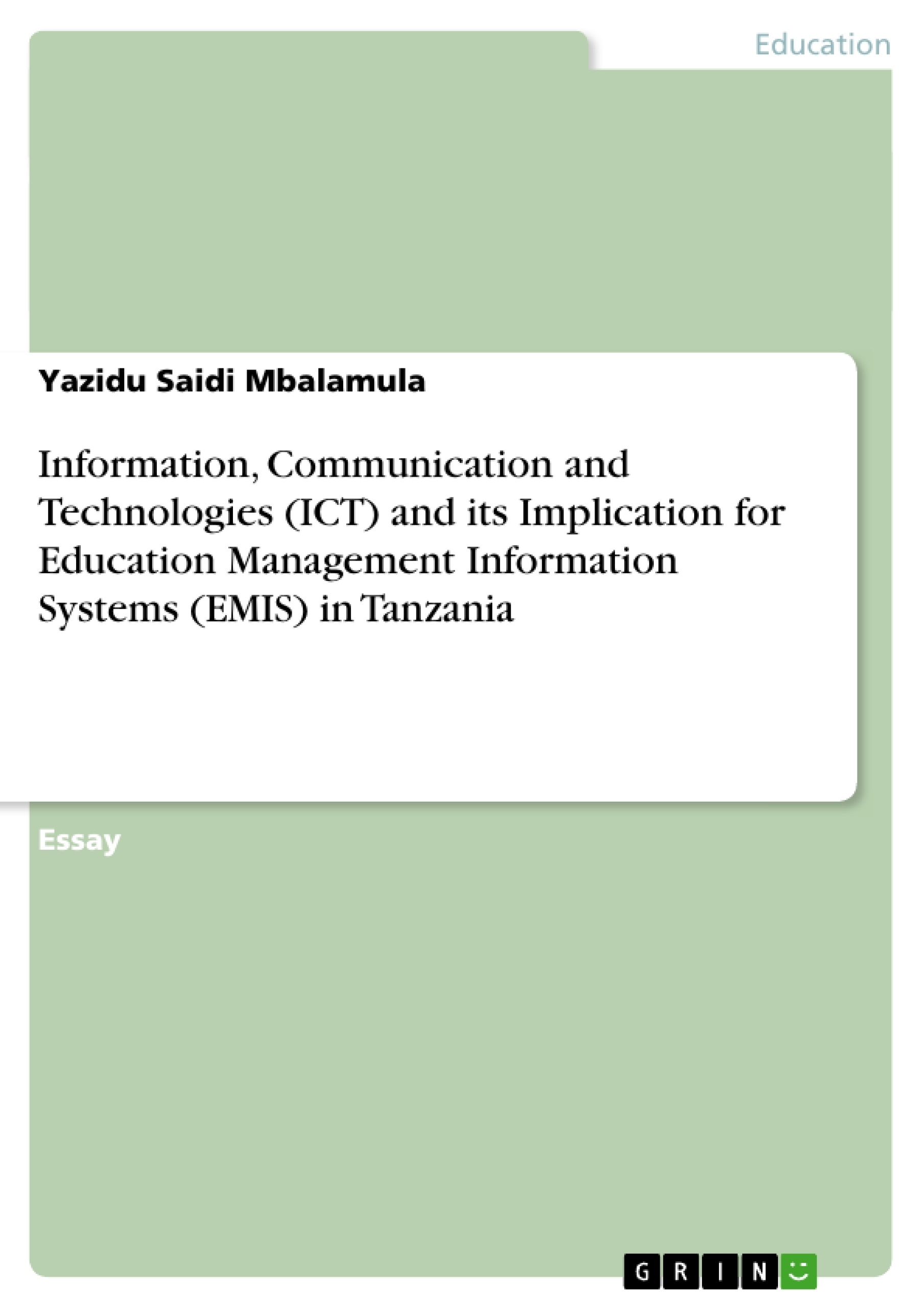Education Management Information System (EMIS) is essential to empower planning process to translate educational policy into actions. The application of Information, Communication and Technology (ICT) in Educational settings is equally important for developing economies such as that of Tanzania to pursue two mutually reinforcing stimulation of socioeconomic and global agenda of economy prosperity goals. There is close link between ICT and EMIS, and the efficiency and effectiveness of latter is considerably affected by the former. It is in this contention that as per analysis made in this paper which reveals that ICT is still suffering from serious shortcomings, which unless solved, EMIS will continue to be ineffective and inefficient strategy. Three major problems identified in the paper include the (i) lack of infrastructure and systems in place to facilitate effective monitoring as a result utilization of ICTs in Tanzanian education institutions are dismal due to low connectivity and teledensity (ii) insufficient numbers of qualified technical personnel to manage and maintain ICT resources, (iii) inadequate training and capacity development resulting in underutilization of ICT facilities. This paper provides a basic and general review of how ICT influences and hampers EMIS effectiveness and efficiency. Also recommendations are provided at the end on how to improvise EMIS in order to maintain quality information in various educational processes.
Inhaltsverzeichnis (Table of Contents)
- Introduction
- ICT Development, Implementation and Challenges
- EMIS Development, Implementation and Challenges
Zielsetzung und Themenschwerpunkte (Objectives and Key Themes)
This paper examines the relationship between Information and Communication Technology (ICT) and Education Management Information Systems (EMIS) in Tanzania, specifically focusing on the impact of ICT on the effectiveness and efficiency of EMIS. The paper explores the challenges facing ICT implementation in Tanzanian educational settings, highlighting the shortcomings that hinder the proper functioning of EMIS. The key themes explored include:- The importance of EMIS in translating educational policy into action.
- The potential of ICT to enhance education management and development in Tanzania.
- The challenges and constraints hindering the effective utilization of ICT in Tanzanian education.
- The critical role of infrastructure, qualified personnel, and training in ICT integration.
- The interconnectedness of ICT and EMIS and the impact of ICT shortcomings on EMIS functionality.
Zusammenfassung der Kapitel (Chapter Summaries)
Introduction
This chapter introduces the concept of Education Management Information Systems (EMIS) and its role in collecting, analyzing, and disseminating educational data for decision-making. It emphasizes the importance of EMIS in supporting planning, tracking, compliance, and strategic intervention in education management. The chapter also discusses the varying definitions and scopes of EMIS across different countries, highlighting the importance of aligning EMIS with specific policy priorities.ICT Development, Implementation and Challenges
This section examines the development and implementation of ICT in Tanzanian education, highlighting the government's efforts to leverage ICT for educational improvement. It discusses the various projects underway, including ICT implementation in teacher colleges, secondary education, and the Ministry of Education website. Despite some promising achievements, the chapter outlines several challenges hindering the effective utilization of ICT in Tanzanian schools, including:- Limited connectivity and teledensity in rural areas.
- Lack of qualified technical personnel to manage and maintain ICT resources.
- Inadequate training and capacity development.
EMIS Development, Implementation and Challenges
This chapter explores the development and implementation of EMIS in Tanzania, highlighting the importance of authentic data for informed decision-making and policy development. It outlines the Tanzanian government's efforts to create a comprehensive ICT and EMIS development plan, but emphasizes the challenges hindering its effective implementation, including:- Inadequate ICT infrastructure and connectivity.
- Lack of qualified personnel to manage and maintain EMIS systems.
Schlüsselwörter (Keywords)
This paper focuses on the intersection of Information and Communication Technology (ICT) and Education Management Information Systems (EMIS) in Tanzania. Key concepts explored include the role of ICT in supporting EMIS, the challenges facing ICT implementation, and the impact of infrastructure, personnel, and training on both ICT and EMIS effectiveness. The paper highlights the critical importance of overcoming these challenges to improve educational planning, management, and quality in Tanzania.Frequently Asked Questions
What is EMIS and why is it important in Tanzania?
Education Management Information System (EMIS) is essential for collecting and analyzing data to translate educational policies into effective actions and tracking progress.
How does ICT influence the effectiveness of EMIS?
ICT is the backbone of modern EMIS; however, shortcomings in ICT infrastructure directly lead to ineffective and inefficient data management strategies.
What are the three major problems facing ICT in Tanzanian education?
The main issues are (1) lack of infrastructure and low connectivity, (2) insufficient qualified technical personnel, and (3) inadequate training for staff.
What is the status of teledensity in Tanzanian rural areas?
Teledensity and connectivity remain dismal in rural areas, which severely hampers the monitoring and utilization of ICT in educational institutions.
How can EMIS be improved in Tanzania?
Recommendations include investing in ICT infrastructure, providing comprehensive capacity development, and recruiting qualified personnel to manage the systems.
- Quote paper
- Yazidu Saidi Mbalamula (Author), 2014, Information, Communication and Technologies (ICT) and its Implication for Education Management Information Systems (EMIS) in Tanzania, Munich, GRIN Verlag, https://www.grin.com/document/271449



